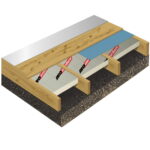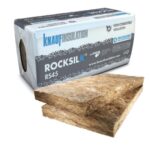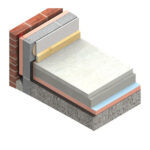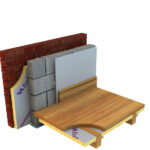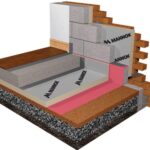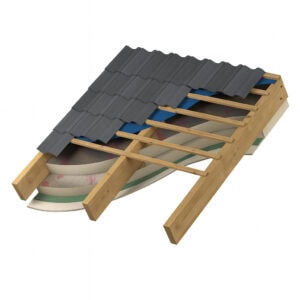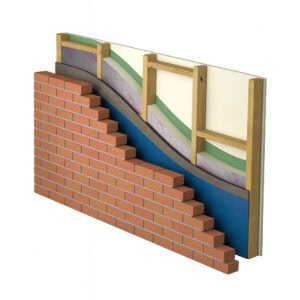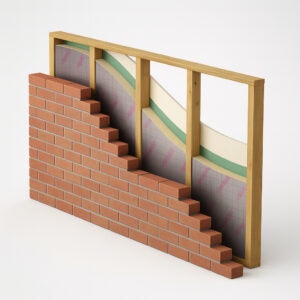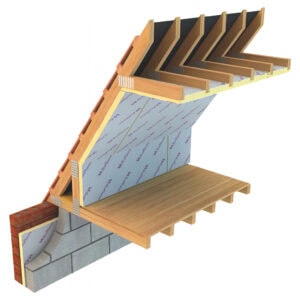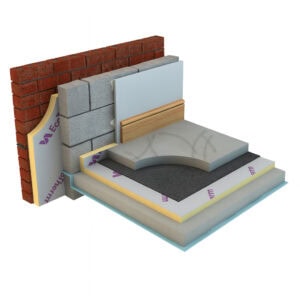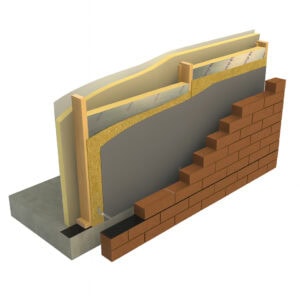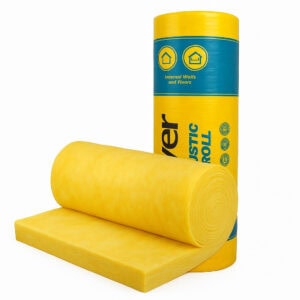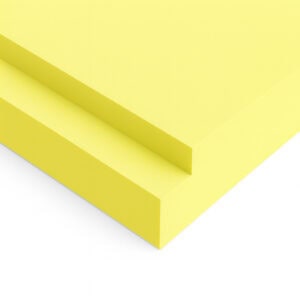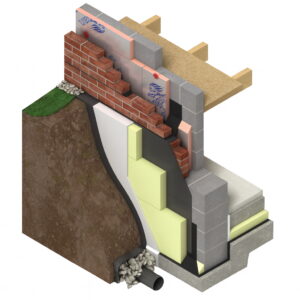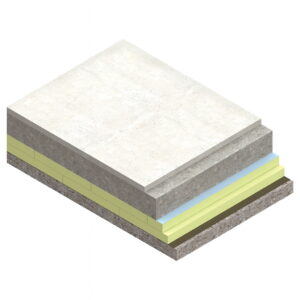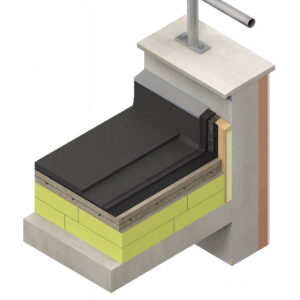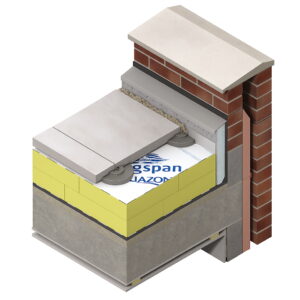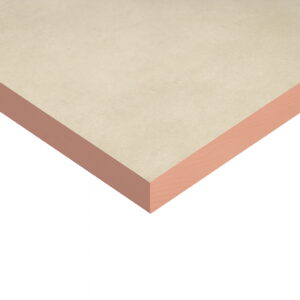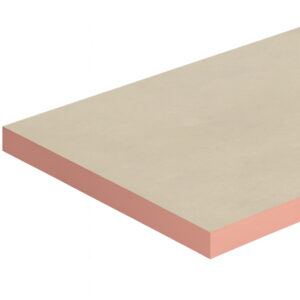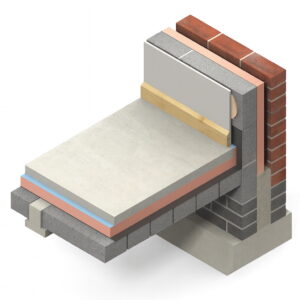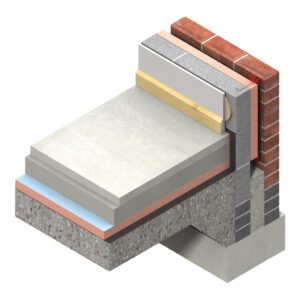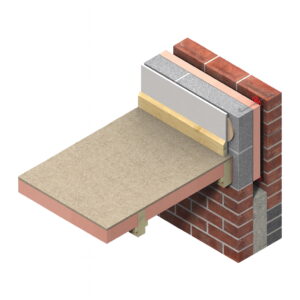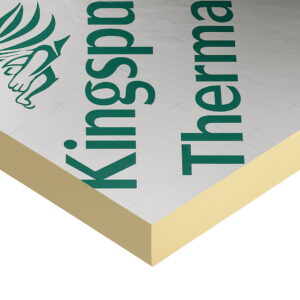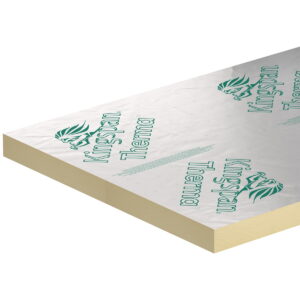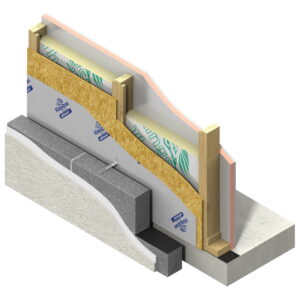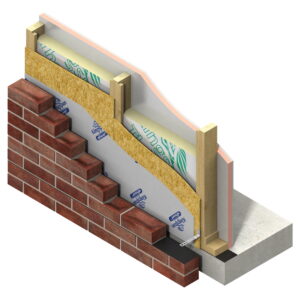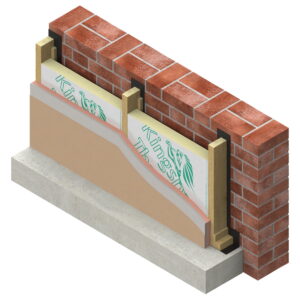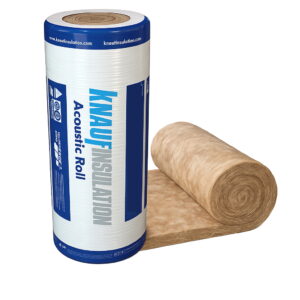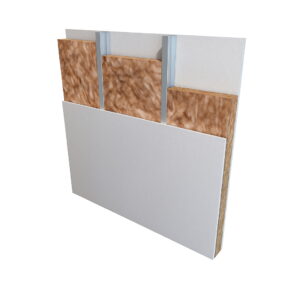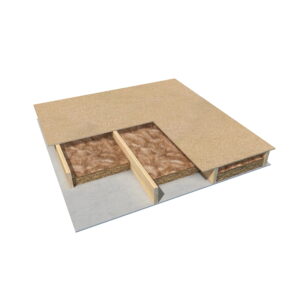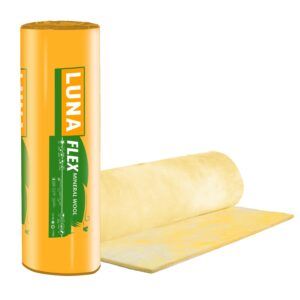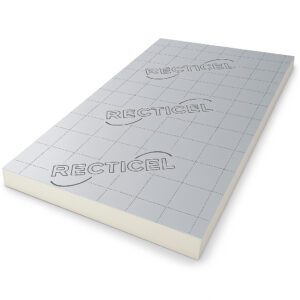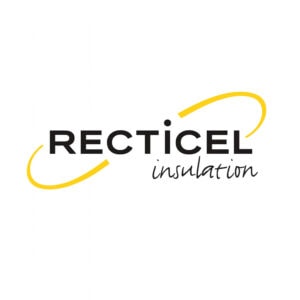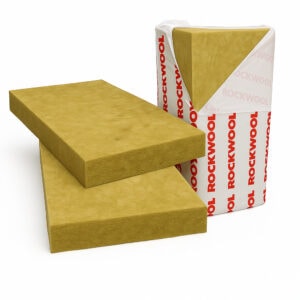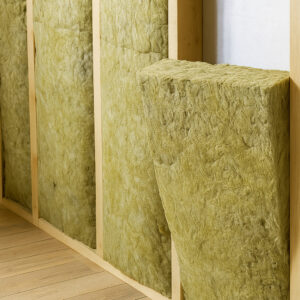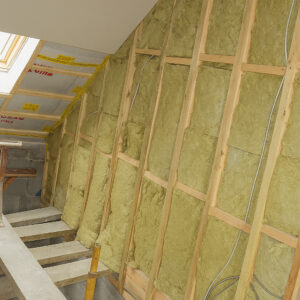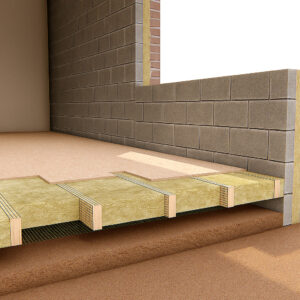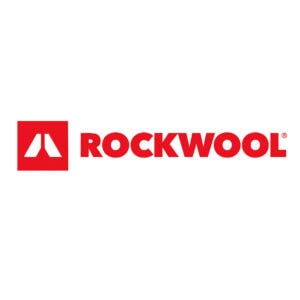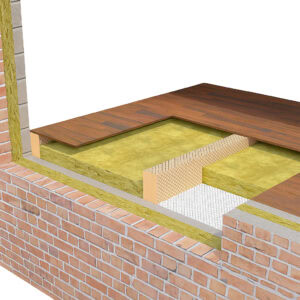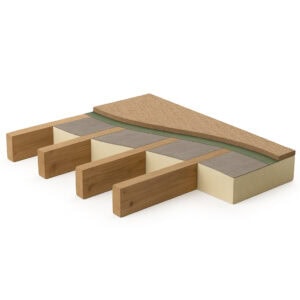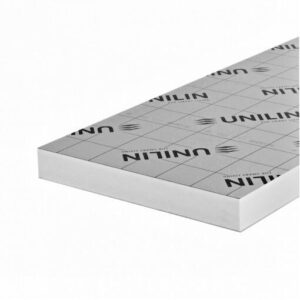Floor Insulation
If you are thinking about how to insulate a floor you are at the right place as in our store, you can get top-quality floor insulation materials which will help you to make your home a warm, energy-efficient, and cosy place for living.
While the floor is not insulated, and this is a common issue for old houses, it allows heat to leak through the floor gaps. Besides, in winter, the soil tends to frost and provide extra cold to the house. This refers to suspended floors, and it’s true for other flooring types as well because heat can be easily distributed to the ground through any flooring type, while floors without insulation freeze and make the environment inside the house colder and your heating bills higher.
Floor insulation is typically installed beneath the flooring to reduce heat leaks by sealing the surface with energy-efficient and durable materials like mineral wool, glass wool, or foam materials. This solution helps to make cold spots warmer, and it suits almost any type of flooring whether it is a concrete floor, a carpet flooring or any type of wooden floors.
Just to help you to understand the efficiency of floor insulation, look at the figures which enclose the essence of this renovation solution.
- More than 20% of heat is wasted in houses where floors are not insulated.
- Carbon footprint minimization reaches 240 kg per year when you insulate floors in an average house.
- Floor insulation materials cost somewhere about £150 per an average home and this money can be paid off in 24 months.
What is Floor Insulation
How does floor insulation work?
The whole idea of floor insulation is to create an additional layer beneath the floorboards or any other type of flooring. This part of renovation can be done using special insulation boards which provide the necessary functions when installed.
When you decide on how to insulate floors in an old house or your cottage, there are a couple of features to consider in advance.
- Low thermal conductivity of the material, as you need to save heat from leakage through the floor.
- A high density of the material combined with elasticity creates an integral surface which will protect floorboards impeccably.
- Long service life – as usual, the floor insulation project is developed during home renovation, and probably, you do not plan to renovate your home annually, so the more durable is floor insulation, the better is for you.
- Environmentally-friendly material is also a must if you want to maintain an eco-friendly lifestyle.
- The ease of installation. This is important in both cases if you want to try your hand at DIY floor insulation and in case you decide to employ a contractor, as the complexity of installation will bring you additional costs.
According to these features, today the most popular types of floor insulation materials are glass mineral wool, polystyrene, and PIR materials.
Specifics of Floor Insulation for Different Types of Flooring
In our store, you can purchase floor insulation materials for different floor types. Typically, insulation projects are used to insulate ground floors or first floors in flat blocks and ground floors which have a basement or a foundation which is not raised.
For floor insulation, we offer you to use some pieces of advice from our consultants to prepare for the project implementation properly.
- Please, calculate the overall weight of the flooring pie so as not to overweight interfloor overlapping and cause its collapse or damage.
- A correct calculation of heat leaks is the way to choose the best floor insulation material and its thickness.
- If you have to insulate floors in a house with low ceilings, you need to pick the material with the lowest thickness, for example, polyurethane foam material.
- Please, keep in mind the fire rating of the material, especially when you decide to insulate wooden floors. You can filter non-combustive types of insulation in our catalogue.
- For concrete floors, you need to remove all the flooring and lay a crate, on which the layer of insulation will be installed. Then it is necessary to install a layer of waterproof membrane, and a subfloor layer on it. Then you can install any finishing flooring of your choice.
According to these pieces of advice, you can use convenient filters in our catalogue to select the best floor insulation material for your home.
Types of Floor Insulation
Besides choosing good flooring insulation materials, you need to consider which goals you have to pursue in your floor insulation project, and which types of floors you are going to insulate. Just have a look at our most popular types of flooring insulation to select the proper one.
Acoustic Floor Insulation
The main intention of acoustic floor insulation is to reduce the impact of noises in houses. This type of insulation helps to solve a couple of problems at once. It helps to increase soundproofing in neighbouring premises, and it also saves heat and protects the floor from heat leaks. In our catalogue, you can select the most effective and durable rolled acoustic insulation materials to isolate your home from neighbours’ noises and outer sounds. We offer a wide choice of slab materials with thicknesses from 25 mm to 180 mm by world-known Knauf and Rockwool brands.
Concrete Floor Insulation
Concrete floors are durable, but they are cold, and they need additional insulation to provide comfort for feet and maintain a warm environment in the house. We offer a good range of materials for maintaining your request on how to insulate an existing concrete floor in the UK. When you add an insulation layer to the concrete slab and a moisture-proof membrane, it works for your home’s comfort. There are over 170 products for concrete floor insulation available in our store including expanded polystyrene boards of different thicknesses and PIR boards by Kingspan, Celotex, and Jablite.
Suspended Floor Insulation
Suspended floors are whimsical in their maintenance. When you decide how to insulate wooden floors, you help your flooring to prolong its service life by adding a layer between boards and wooden joists. Besides, the layer of insulation seals the gaps between timber boards and creates an integral surface which won’t let heat through it. There are various types of suspended floors insulation in stock including PIR boards, rock wool plates, and boards of expanded and extruded polystyrene.
Underfloor Insulation
Underfloor insulation can be used for different flooring types, and they are typically installed under the finishing layer of flooring. There are diverse types of underfloor insulation you can pick in our store, and you can use it during your renovation routines or while flooring replacement. We offer over 200 products in this category to fulfil the requirements of every customer.
Floor Insulation Benefits
Considering how to insulate my floor, it is better to get through the main benefits which you get after you provide your floor insulation project. These are as follows:
- Floor insulation helps to reduce heating losses in the cold season as it provides an additional layer between the upper flooring and basement and doesn’t let heat through it.
- When you decide to insulate your floor, you save money on heating and air conditioning. An insulated floor provides a cooler temperature inside the premises in summer and a warmer microclimate in the room in winter.
- All types of floor insulation improve the soundproofing of the house.
- You can make your flooring service life longer when providing its insulation.
The Best Types and Manufacturers for Flooring Insulation in Our Online Store
When you ask yourself how to insulate a floor in your house or flat, you can be sure that you can get help in our store. We work with top-notch insulation board manufacturers and provide our customers with the highest-quality materials for flooring insulation.
We work with the following insulation manufacturers, which proved the exceptional quality and reliability of their materials:
- Recticel Eurothane GP
- Ecotherm Eco-Versal
- Kingspan TF70/K103
- Jablite Polystyrene EPS
- Mannok PIR Insulation
- Unilin Thin-R PIR Insulation
- Rockwool Acoustic Insulation
- Knauf Rocksilk Insulation
If you need to get a piece of advice about which insulation type to choose and how to insulate flooring, our consultants are gladly ready to help you and provide detailed consultation which will make the purchase easy, convenient, and cost-saving for you.
The Most Commonly Asked Questions About Floor Insulation
Does Floor Insulation Help to Mitigate Heat Leaks?
Yes, it can help you to save heat in your home, and it is one of the most cost-saving solutions for ground floors and first floors where heat leaks through the flooring are considerable.
What is better to select for floor insulation: mineral wool or polystyrene?
This depends much on your flooring type, residence region, and wall insulation. Please, contact our consultants to get detailed consultation about which material will suit you the best.
How can you insulate between floors?
The first step is to purchase reliable insulation. Then it’s up to you either to provide floor insulation yourself or to hire a contractor for this task.
Is it necessary to insulate floors on the upper storeys of the building?
Generally, it is necessary to insulate the ground floor, especially if your home doesn’t have a high foundation, and the first floor. Upper floors can be used without insulation, except for acoustic insulation if you want to make your rooms soundproof.
Is it worth insulating a garage floor?
It can be a good idea if you want to save costs on garage heating in winter.
Our experienced team also provides sound and sensible advice regarding the materials and installation. For consultation and product recommendations call us on 0203 318 7316 and we will be more than happy to help.
Showing 1–32 of 210 results
-
100mm Celotex GA4100 PIR Insulation Board 2400mm x 1200mm (8′ x 4′) 2.88m2
100mm Celotex GA4100 is a polyisocyanurate (PIR) insulation core with composite aluminium foil facings on both sides. Celotex is a multi-purpose insulation board suitable for use in pitched roofs, ceilings, floors and walls.
£26.83£32.20 Ex VATInc VAT£9.32£11.18 Per M2 Add to cart -
100mm Ecotherm Eco-Versal Rigid PIR Insulation Board 2400mm x 1200mm (8′ x 4′) 2.88m2
100mm Ecotherm Eco-Versal is a polyisocyanurate (PIR) insulation core with composite aluminium foil facings on both sides. Ecotherm Eco-Versal is a multi-purpose insulation board suitable for use in pitched roofs, ceilings, floors and walls.
£27.15£32.58 Ex VATInc VAT£9.43£11.32 Per M2 Add to cart -
100mm Expanded Polystyrene EPS100 Insulation Board 2400mm x 1200mm (8′ x 4′) Pack of 24 (69.12m2)
100mm EPS100, often known as Expanded Polystyrene, is a lightweight foam product produced from tiny polystyrene beads. Due to its high thermal value and simplicity of usage, it is commonly used as one of the most favoured insulation materials in construction.
£420.25£504.30 Ex VATInc VAT£6.08£7.30 Per M2 Add to cart -
100mm Expanded Polystyrene EPS150 Floor Insulation Board 2400mm x 1200mm (8′ x 4′) Pack of 6 (17.28m2)
100mm EPS150, often known as Expanded Polystyrene, is a lightweight foam product produced from tiny polystyrene beads. Due to its high thermal value and simplicity of usage, it is commonly used as one of the most favoured insulation materials in construction.
£159.72£191.66 Ex VATInc VAT£9.24£11.09 Per M2 Add to cart -
100mm Expanded Polystyrene EPS200 Floor Insulation Board 2400mm x 1200mm (8′ x 4′) Pack of 6 (17.28m2)
100mm EPS200, often known as Expanded Polystyrene, is a lightweight foam product produced from tiny polystyrene beads. Due to its high thermal value and simplicity of usage, it is commonly used as one of the most favoured insulation materials in construction.
£282.11£338.53 Ex VATInc VAT£16.33£19.60 Per M2 Add to cart -
100mm Expanded Polystyrene EPS250 Floor Insulation Board 2400mm x 1200mm (8′ x 4′) Pack of 6 (17.28m2)
100mm EPS250, often known as Expanded Polystyrene, is a lightweight foam product produced from tiny polystyrene beads. Due to its high thermal value and simplicity of usage, it is commonly used as one of the most favoured insulation materials in construction.
£374.89£449.87 Ex VATInc VAT£21.70£26.04 Per M2 Add to cart -
100mm Expanded Polystyrene EPS70 Insulation Board 2400mm x 1200mm (8′ x 4′) 2.88m2 (Pack of 6)
100mm EPS70, often known as Expanded Polystyrene, is a lightweight foam product produced from tiny polystyrene beads. Due to its high thermal value and simplicity of usage, it is commonly used as one of the most favoured insulation materials in construction.
£93.00£111.60 Ex VATInc VAT£5.38£6.46 Per M2 Add to cart -
100mm Isover Acoustic Partition Insulation Roll – Glass Mineral Wool 11m2
100mm Isover Acoustic Partition Insulation Roll is a glass mineral wooldesigned to reduce sound transmission between walls and floors, creating quieter and more comfortable spaces.
£45.17£54.20 Ex VATInc VAT£4.11£4.93 Per m2 Add to cart -
100mm Kingspan GreenGuard GG300 R Rigid Extruded Polystyrene Insulation Board 1250mm x 600mm Pack of 4 (3.00m2)
100mm Kingspan GreenGuard GG300 is a high performance rigid extruded polystyrene insulation. It is used to insulate inverted roofs, basements, car park decks, and heavy-duty commercial, industrial and cold store flooring offering a thermal conductivities as low as 0.033 W/mK.
£54.49£65.39 Ex VATInc VAT£18.16£21.79 Per M2 Add to cart -
100mm Kingspan Kooltherm K103 Insulation Floorboard 2400mm x 1200mm Pack of 3 (8.64m2)
100mm Kooltherm K103 is a premium phenolic core floor insulation solution, designed to deliver exceptional performance with solid concrete or suspended timber floors.
£289.93£347.92 Ex VATInc VAT£33.56£40.27 Per M2 Add to cart -
100mm Kingspan Therma TP10 / TF70 / TW55 PIR Insulation Board 2400mm x 1200mm (8′ x 4′) Pack of 3 (8.64m2)
All three models 100mm Kingspan Therma PIR Insulation Board:
- 100mm Thermapitch TP10
- 100mm Thermafloor TF70
- 100mm Thermawall TW55
share the same high-performance PIR core and low-emissivity foil facings, offering excellent thermal efficiency and easy installation. Although labeled differently, these boards share identical technical specifications.
£138.93£166.72 Ex VATInc VAT£16.08£19.30 Per M2 Add to cart -
100mm Knauf Acoustic Insulation Roll – Glass Mineral Wool 12.36m2
100mm Acoustic Insulation Roll from Knauf is a Glass Mineral Wool roll, designed for use in internal wall and floor applications, to offer sound absorption and noise reduction properties.
£49.44£59.33 Ex VATInc VAT£4.00£4.80 Per m2 Add to cart -
100mm ODE Acoustic Roll Insulation 7.8m2 Roll
100mm ODE Insulation Acoustic Roll is designed to reduce sound transmission, making it an ideal solution for creating quieter indoor environments. Its flexible and simple-to-install design effectively absorbs sound, making it perfect for both residential and commercial spaces.
£23.38£28.06 Ex VATInc VAT£3.00£3.60 Per m2 Add to cart -
100mm Recticel Eurothane GP PIR Insulation Board 2400mm x 1200mm (8′ x 4′) 2.88m2
100mm Recticel Eurothane GP is a polyisocyanurate (PIR) insulation core with composite aluminium foil facings on both sides. Recticel is a multi-purpose insulation board suitable for use in pitched roofs, ceilings, floors and walls.
£26.83£32.20 Ex VATInc VAT£9.32£11.18 Per M2 Add to cart -
100mm Rockwool Flexi Slab Acoustic Insulation 1200mm x 600mm 4.32m2 Pack
100mm Rockwool Flexi has been designed as a multi-use, dual-purpose acoustic and thermal mineral wool insulation with a unique flexible edge along one side. It is suitable for use all over the home, in pitched roof rafters, framed external walls, internal partitions, intermediate floors, separating walls and floors, and timber suspended ground floors.
£40.41£48.49 Ex VATInc VAT£9.35£11.22 Per m2 Add to cart -
100mm Rockwool RWA45 Acoustic Insulation Slab 1200 x 600mm 2.88m2 Pack
100mm Rockwool RWA45 has been developed for thermal, acoustic and fire performance in a range of construction types. It is suitable for applications on partition walls, ceilings, floors and roofs.
£21.39£25.67 Ex VATInc VAT£7.43£8.92 Per m2 Add to cart -
110mm Celotex XR4110 PIR Insulation Board 2400mm x 1200mm (8′ x 4′) 2.88m2
110mm Celotex XR4110 is a polyisocyanurate (PIR) insulation core with composite aluminium foil facings on both sides. Celotex is a multi-purpose insulation board suitable for use in pitched roofs, ceilings, floors and walls.
£32.42£38.90 Ex VATInc VAT£11.26£13.51 Per M2 Add to cart -
110mm Ecotherm Eco-Versal Rigid PIR Insulation Board 2400mm x 1200mm (8′ x 4′) 2.88m2
110mm Ecotherm Eco-Versal is a polyisocyanurate (PIR) insulation core with composite aluminium foil facings on both sides. Ecotherm Eco-Versal is a multi-purpose insulation board suitable for use in pitched roofs, ceilings, floors and walls.
£33.97£40.76 Ex VATInc VAT£11.80£14.16 Per M2 Add to cart -
110mm Recticel Eurothane GP PIR Insulation Board 2400mm x 1200mm (8′ x 4′) 2.88m2
110mm Recticel Eurothane GP is a polyisocyanurate (PIR) insulation core with composite aluminium foil facings on both sides. Recticel is a multi-purpose insulation board suitable for use in pitched roofs, ceilings, floors and walls.
£32.42£38.90 Ex VATInc VAT£11.26£13.51 Per M2 Add to cart -
110mm Unilin Thin-R PIR Insulation Board 2400mm x 1200mm (8′ x 4′) Pallet of 21 (60.48m2)
110mm Unilin Thin-R PIR insulation is a foil faced, high-performance insulation solution that offers exceptional thermal efficiency and durability. This polyisocyanurate insulation board, formerly known as Xtratherm, is ideal for a range of applications, such as floors, pitched roofs, and walls.
POA Get a quote -
120mm Celotex XR4120 PIR Insulation Board 2400mm x 1200mm (8′ x 4′) 2.88m2
120mm Celotex XR4120 is a polyisocyanurate (PIR) insulation core with composite aluminium foil facings on both sides. Celotex is a multi-purpose insulation board suitable for use in pitched roofs, ceilings, floors and walls.
£33.04£39.65 Ex VATInc VAT£11.47£13.76 Per M2 Add to cart -
120mm Ecotherm Eco-Versal Rigid PIR Insulation Board 2400mm x 1200mm (8′ x 4′) 2.88m2
120mm Ecotherm Eco-Versal is a polyisocyanurate (PIR) insulation core with composite aluminium foil facings on both sides. Ecotherm Eco-Versal is a multi-purpose insulation board suitable for use in pitched roofs, ceilings, floors and walls.
£33.18£39.82 Ex VATInc VAT£11.52£13.82 Per M2 Add to cart -
120mm Kingspan GreenGuard GG300 R Rigid Extruded Polystyrene Insulation Board 1250mm x 600mm Pack of 3 (2.25m2)
120mm Kingspan GreenGuard GG300 is a high performance rigid extruded polystyrene insulation. It is used to insulate inverted roofs, basements, car park decks, and heavy-duty commercial, industrial and cold store flooring offering a thermal conductivities as low as 0.033 W/m·K
£49.44£59.33 Ex VATInc VAT£21.97£26.36 Per M2 Add to cart -
120mm Kingspan Kooltherm K103 Insulation Floorboard 2400mm x1200mm Pack of 2 (5.76m2)
120mm Kooltherm K103 is a premium phenolic core floor insulation solution, designed to deliver exceptional performance with solid concrete or suspended timber floors.
£243.84£292.61 Ex VATInc VAT£42.33£50.80 Per M2 Add to cart -
120mm Kingspan Therma TP10 / TF70 / TW55 PIR Insulation Board 2400mm x 1200mm (8′ x 4′) Pack of 2 (5.76m2)
All three models 120mm Kingspan Therma PIR Insulation Board:
- 120mm Thermapitch TP10
- 120mm Thermafloor TF70
- 120mm Thermawall TW55
share the same high-performance PIR core and low-emissivity foil facings, offering excellent thermal efficiency and easy installation. Although labeled differently, these boards share identical technical specifications.
£111.30£133.56 Ex VATInc VAT£19.32£23.18 Per M2 Add to cart -
120mm Recticel Eurothane GP PIR Insulation Board 2400mm x 1200mm (8′ x 4′) 2.88m2
120mm Recticel Eurothane GP is a polyisocyanurate (PIR) insulation core with composite aluminium foil facings on both sides. Recticel is a multi-purpose insulation board suitable for use in pitched roofs, ceilings, floors and walls.
£33.04£39.65 Ex VATInc VAT£11.47£13.76 Per M2 Add to cart -
125mm Kingspan Therma TP10 / TF70 / TW55 PIR Insulation Board 2400mm x 1200mm (8′ x 4′) Pack of 2 (5.76m2)
All three models 20mm Kingspan Therma PIR Insulation Board:
- 125mm Thermapitch TP10
- 125mm Thermafloor TF70
- 125mm Thermawall TW55
share the same high-performance PIR core and low-emissivity foil facings, offering excellent thermal efficiency and easy installation. Although labeled differently, these boards share identical technical specifications.
£128.56£154.27 Ex VATInc VAT£22.32£26.78 Per M2 Add to cart -
130mm Celotex XR4130 PIR Insulation Board 2400mm x 1200mm (8′ x 4′) 2.88m2
130mm Celotex XR4130 is a polyisocyanurate (PIR) insulation core with composite aluminium foil facings on both sides. Celotex is a multi-purpose insulation board suitable for use in pitched roofs, ceilings, floors and walls.
£39.41£47.29 Ex VATInc VAT£13.68£16.42 Per M2 Add to cart -
130mm Ecotherm Eco-Versal Rigid PIR Insulation Board 2400mm x 1200mm (8′ x 4′) 2.88m2
130mm Ecotherm Eco-Versal is a polyisocyanurate (PIR) insulation core with composite aluminium foil facings on both sides. Ecotherm Eco-Versal is a multi-purpose insulation board suitable for use in pitched roofs, ceilings, floors and walls.
£40.21£48.25 Ex VATInc VAT£13.96£16.75 Per M2 Add to cart -
130mm Expanded Polystyrene EPS250 Floor Insulation Board 2400mm x 1200mm (8′ x 4′) Pack of 4 (11.52m2)
130mm EPS250, often known as Expanded Polystyrene, is a lightweight foam product produced from tiny polystyrene beads. Due to its high thermal value and simplicity of usage, it is commonly used as one of the most favoured insulation materials in construction.
£324.90£389.88 Ex VATInc VAT£28.20£33.84 Per M2 Add to cart -
130mm Recticel Eurothane GP PIR Insulation Board 2400mm x 1200mm (8′ x 4′) 2.88m2
130mm Recticel Eurothane GP is a polyisocyanurate (PIR) insulation core with composite aluminium foil facings on both sides. Recticel is a multi-purpose insulation board suitable for use in pitched roofs, ceilings, floors and walls.
£39.44£47.33 Ex VATInc VAT£13.69£16.43 Per M2 Add to cart -
140mm Kingspan Kooltherm K103 Insulation Floorboard 2400mm x1200mm Pack of 2 (5.76m2)
140mm Kooltherm K103 is a premium phenolic core floor insulation solution, designed to deliver exceptional performance with solid concrete or suspended timber floors.
£280.84£337.01 Ex VATInc VAT£48.76£58.51 Per M2 Add to cart
